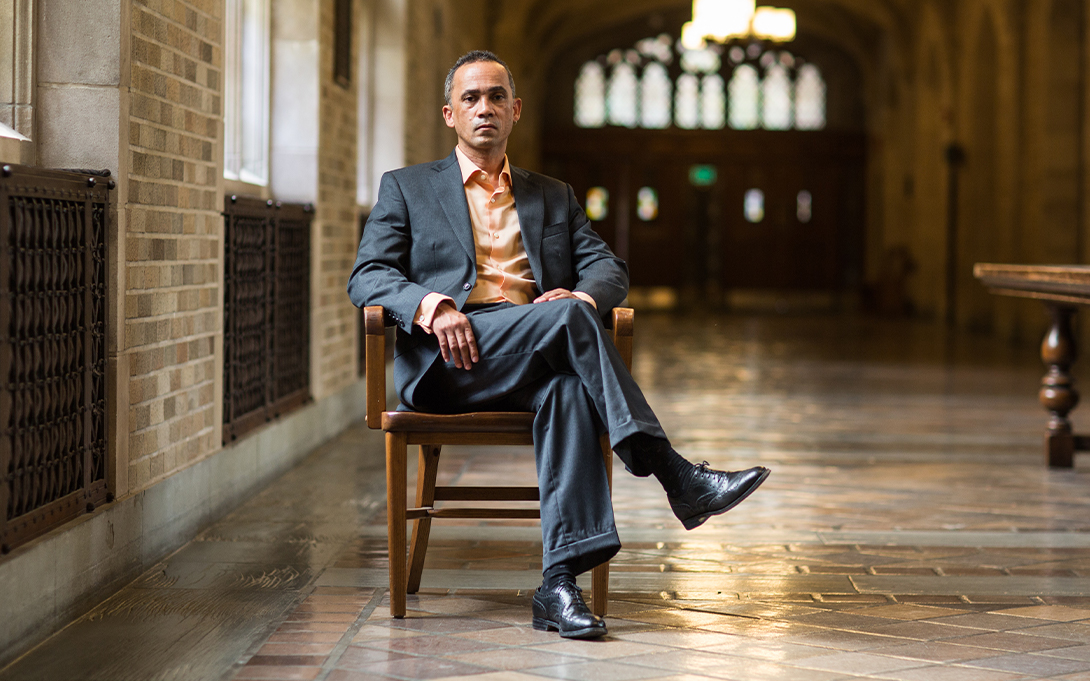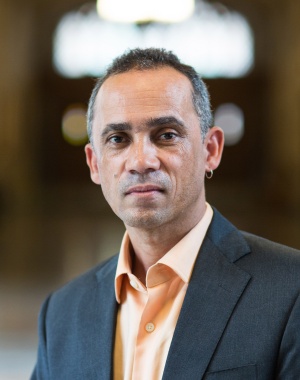
Twenty years after South Africa ratified its post-apartheid Constitution, faculty member Yazier Henry reflects on the country’s painful, intractable inequality
Last year, Yazier Henry paid $99 for a DNA testing kit, then dropped a saliva sample in the mail. Six weeks later, the results arrived: 39 percent Asia, 27 percent Europe, 27 percent Africa, 7 percent Pacific Islander. His “ethnicity estimates”—Yazier’s own body and blood—tell a 350-year story of colonialism, slavery, resistance, and liberation.
Yazier was born and raised in Cape Town, South Africa, and some of his ancestors were likely removed by Dutch colonialists from what is now Indonesia: banished for their resistance or enslaved to build the colony at the Cape.
He’d suspected as much. But having dedicated his adult life to language and narrative—to intellectual inquiry and teaching on issues related to inequality, injustice, and peace—Yazier was driven to write and to read his own part of the story in full.
Crimes unsettled
After centuries of colonialism, the formalization of apartheid, protests, violent repression, and international pressure, a new hope dawned for South Africa in the 1990s. The apartheid government was defeated. Resistance leader Nelson Mandela walked free from prison in 1990 and was elected president in 1994.
Today, that hope is under threat. South Africa is one of the most unequal countries in the world, with racialized violence, poverty, and exclusion seemingly frozen in amber. Over half of South Africans live below the national poverty line and more than 10 percent live in extreme poverty, on less than $1.25 per day.
The “haves” under the apartheid system still hold the economic power, Yazier says, joined now by what he calls “a new political and administrative black elite.”
“For two decades, there has been a global acceptance that apartheid as a crime has been settled in South Africa,” Yazier says. “It has not been settled.”
The nation’s extreme inequality is perhaps most readily visible in the country’s strictly delineated, dramatic residential segregation.
Even in context with hundreds of years of colonial land grabs, the apartheid government’s policy of forced removals was particularly brutal. From 1960 to 1983, 3.5 million people were removed by force from their homes and neighborhoods.
Yazier’s father, Desmond, was among them.
As a boy, Yazier remembers his father sneaking into matches at the Cricket Grounds in Newlands, Cape Town. Newlands, like most of the now lush suburbs at the base of Table Mountain, had been legally declared a ‘white group area’ at the height of the forced removals.
Nine miles away, but an economic world apart, Yazier’s mother, Freda, led neighborhood efforts to support the boycotts that were critical to the anti-apartheid resistance—boycotts that included cricket matches.
Those clandestine matches provoked the only parental fights Yazier can recall. But it was only after his father’s death in 2012 that Yazier learned that his father had been born in Newlands—the Cricket Grounds had been his boyhood haunt—a family story erased.
A rush to reconciliation
Yazier counts the persistence of apartheid-engineered ghettos—and the broader persistence of desperate inequality—as among the enduring, devastating failures of the Truth and Reconciliation Commission (TRC).
While many see the TRC as a watershed landmark in post-conflict justice, Yazier and other scholars increasingly characterize the TRC as a deeply flawed process, bereft of real accountability.
Yazier himself testified before the TRC and later worked for the Commission. He remembers the hope he felt, the confidence that he and his colleagues were laying the foundation for a peaceful, just democracy.
But today he explains that the TRC identified and catalogued only the most shocking atrocities and some key perpetrators. The result, Yazier says, was to silence both apartheid’s victims, who were told to move on, and its beneficiaries, who no longer felt pressured to discuss their complicity.
If you’ve spent time in the classroom with Yazier, you won’t be surprised to learn that when asked what the TRC process could have done to change South Africa’s trajectory, he resists simple answers.
Instead, he calls for a new language to be found—one that could transcend the violent, lingering landscape of inequality. It could and should begin, Yazier says, with an official state apology for apartheid—an acknowledgement that the new state is responsible for addressing the atrocities of the old.
“Human rights, democracy, and the systematic creation and construction of atrocity take place over time,” Yazier says, “They don’t just occur, and they don’t just end.”
In South Africa and elsewhere, the dominant groups and narratives moved on too quickly, he says, from the social pain, economic costs, and political legacies that persist.
The long run
But apartheid did end officially, Yazier notes. “And it’s important to mark that. If we don’t, it’s easy to forget all those who contributed to its end.”
He tells a story about an old woman—an activist and an intellectual—who was asked whether, given the grim statistics, life in South Africa is essentially the same as before apartheid’s defeat. The woman acknowledged her economic suffering, but her answer was unequivocal: never again would a white person push her off a sidewalk and get away with it, and think it okay.
“Understanding that apartheid was defeated is important. It was defeated.” Yazier takes a lengthy pause. “It did not simply evaporate.”
“For peace and equality to be articulated in the long run, there needs to be more in terms of law and policy. Because apartheid colonized not only the land. It colonized our hearts and minds. It wrote itself into our blood.” Liberation, Yazier says, is in this sense also personal.
Training thinkers and doers
Yazier first joined the faculty in 2007 as a Towsley Foundation Policymaker in Residence and was invited to return in 2008. Although he travels back to South Africa regularly, he’s been teaching at the Ford School ever since.
In addition to his research and writing, Yazier sees his work as training students to provide intellectual leadership in the context of ongoing inequality in the world.
Reflecting on himself as an anti-apartheid activist at age sixteen, Yazier notes that “sometimes as young people, we want to think of ourselves as the first iteration.”
“We had to tell our parents in 1985, no, we will not accept living under apartheid any longer,” Yazier says. “I didn’t finish high school then because at that time, our slogan was liberation before education.”
But that was too simplistic, he notes. “The building of the structures of equality, peace, and democracy is continuous. It’s simultaneous and ongoing and you cannot wait for them to be created for you. We are building at the same time as we are moving.”
The problems and solutions we face, Yazier tells his students, “do not exist outside of the people and language of their creation. Systems that foster equality and peace are conceived of and built—just like those that produce inequality and pain.”
Yazier’s students are writing a new story—a story of a more equal, peaceful, just, and engaged future.
By Laura K. Lee (MPP ’96) for State & Hill, the magazine of the Gerald R. Ford School of Public Policy
Below is a formatted version of this article from State & Hill, the magazine of the Ford School. View the entire Spring 2016 State & Hill here.

